by Lisa Cooke | Mar 26, 2016 | 01 What's New, Church, Listeners & Readers
A Dutch genealogy researcher writes in with tips and encouragement for finding your family history in The Netherlands.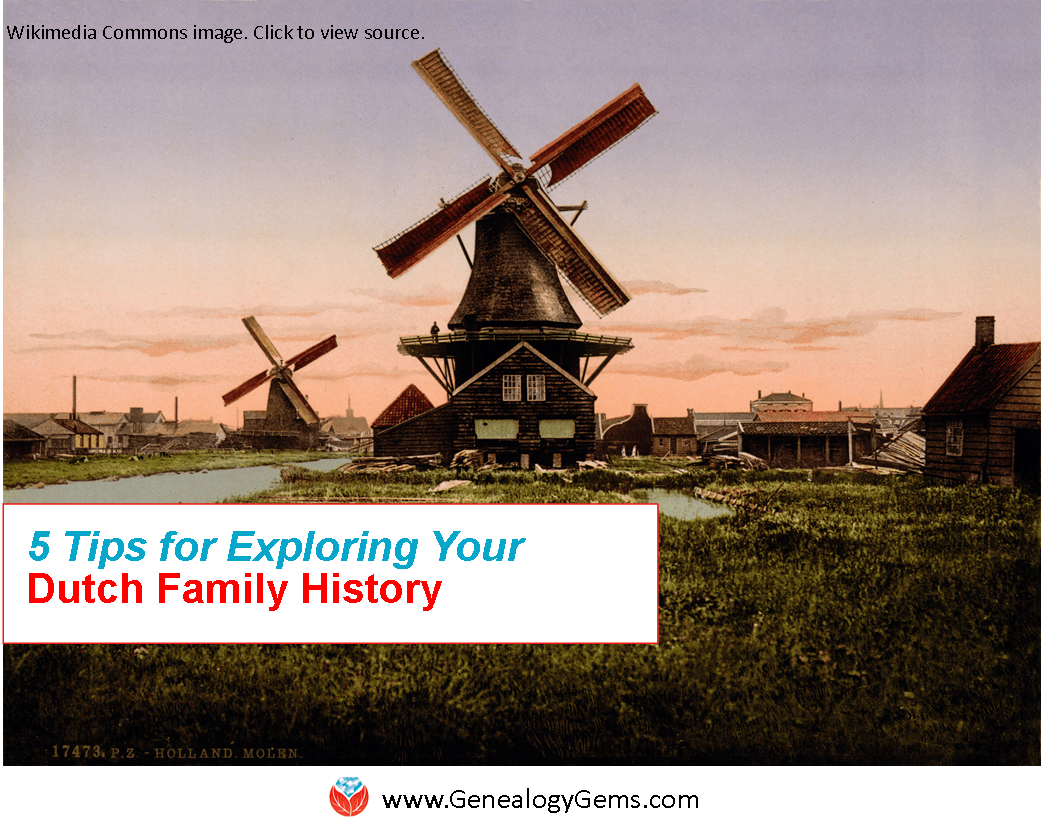
Niek in Arnhem, The Netherlands recently wrote in with 5 excellent and enthusiastic tips for exploring your Dutch family history. Here’s what he had to say about the civil registry, surnames, church records, land records and royal lineages:
“About three years ago my father got diagnosed with skin cancer and to help him get his mind of things I opened up an account on MyHeritage for us, so we could start working on our family tree together. Maybe I have some tips that could be of some value for your listeners with roots in The Netherlands:
1. Civil registry. In 1811, the civil registry was introduced by the French, who ruled the country. This meant that municipalities were obliged to keep the records (marriage, death and birth) of their citizens. That system hasn’t changed much since 1811 and most of the information can be found online on websites like www.wiewaswie.nl and www.geneaknowhow.net (the latter has some English translations as well). It’s very easy to find your Dutch ancestors [back] to 1811. For example, I know the names and most of the date of births and deaths of 60 of my 64 four-times great-grandfather who lived during the introduction of the civil registry.
For me, the most exciting thing about these post-1811 documents is that they were often signed by the father of the newborn or by the bride and groom. To see the 200 year-old signature of your ancestor can really send shivers down the spine! [Click here to read more about Dutch civil registration on the FamilySearch wiki.]
2. Surnames. The introduction of the civil registry also meant that citizens had to have a last name. Up to then last names were used, but not mandatory. It could be that last names would change after a generation. For example, my last name, Lucassen means Son of Lucas, my oldest paternal ancestor I could find was named Lucas Jans, which means Lucas, son of Jan. And his son was called Jan Lucassen, and this last name was passed down the generations (although some of his children had Janssen, son of Jan, as a last name).
3. Catholic church records. I am from the province of Brabant, which was a Catholic province. Before 1811, records were kept by the church. The Catholic church was particularly skilled at keeping records and information. Although they unfortunately don’t have dates of birth and dates of death, they used to register the dates of baptism and burial. (A baptism date isn’t the same as a a date of birth, although, in the civil registry marriage certificates, the date of birth is the same as the date of baptism.) [Click here for a FamilySearch wiki article on Dutch church records.]
4. Land records. Apart from the church the municipalities kept records of sales of land and property, which is a great way to find out more about the family relations of your ancestors, and about the houses they may have owned. For many parts of the country, these records can easily go back to the 17th century. [This FamilySearch wiki article tells you more about Dutch land and property records.]
5. Royal lineages. If you’re lucky you’re able to connect one of the branches of your family tree to nobility, as many parts of The Netherlands and the rest of Europe were ruled by knights and viscounts. If this is the case in your family, you can easily climb up in your family tree for several centuries because the family relationships of nobility is very well documented and an important part of their heritage (like the story you told about your visit to Windsor Castle) because of the possession of land over which they ruled. Sometimes you do hit a dead-end when a parent of one of your ancestors isn’t known, or isn’t known for certain. But some of the lines travel back really, really far! [Click here for a FamilySearch Wiki article with more on researching noble lines.]
More Dutch Genealogy Gems
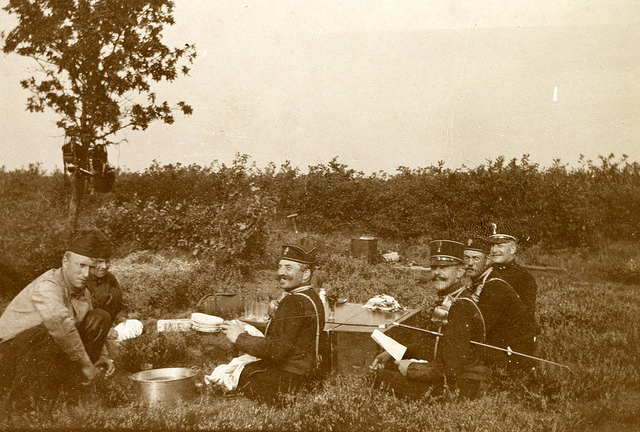
“Exercise Field Artillery Corps” album, image AKL092038, Netherlands Institute of Military History uploads at Flickr Creative Commons, https://www.flickr.com/photos/nimhimages/16026248719/.
Dutch Reformed Church Records (U.S.) on Ancestry.com
Europeana Digital Archive: World War I Collection
Netherlands Military Institute of History has Flickr Photostream
by Lisa Cooke | Mar 25, 2016 | 01 What's New, Records & databases
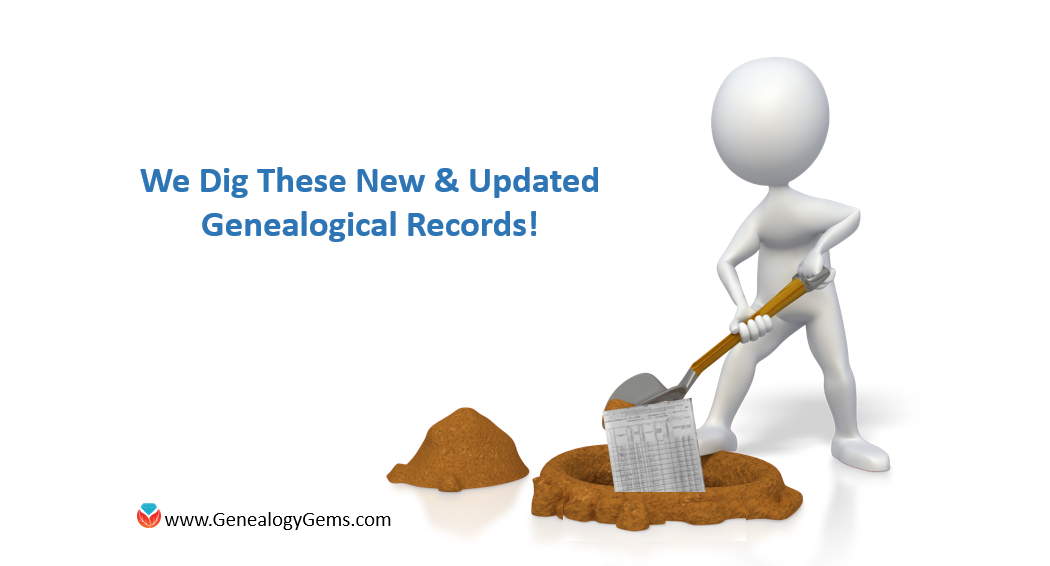 Here’s our weekly roundup of new genealogy records online. Do you see anything you should be searching for your ancestors?
Here’s our weekly roundup of new genealogy records online. Do you see anything you should be searching for your ancestors?
Featured: U.S. – SOUTH DAKOTA CENSUS. The 1945 South Dakota state census collection at Ancestry.com has been updated. According to a FamilySearch.org collection description (where it can also be searched for free), “This 1945 South Dakota State Census is an every-name list of the state’s inhabitants as of 1945. The records are handwritten on printed cards and are arranged alphabetically by surname. People enumerated in the census are recorded individually; the census records do not show individuals in family groups.” It’s wonderful to see census records access pushing past that 1940 blackout!
AUSTRALIA VITAL RECORDS. Findmypast.com has updated collections of birth, marriage and death records for Western Australia. Transcripts for all three record sets appear to be taken from original civil registrations, which began in 1841.
SPAIN MUNICIPAL RECORDS. A free collection of Cádiz municipal records (1784-1956) has been updated with over 155,000 new browsable images at FamilySearch.org. The full collection (some of which is indexed) includes “civil registration records, censuses, military records, and other miscellaneous records microfilmed and digitized at municipal archives in the province of Cádiz, Spain.”
U.S. – LOUISIANA WILLS/PROBATE. Ancestry.com’s collection of wills and estate records for Louisiana (1756-1984) has been updated. Indexed images represent nearly 3/4 of Louisiana parishes.
U.S. – NEW YORK CHURCH. Findmypast.com has updated its collection of New York State Religious Records, 1716-1914. Find indexed images of baptisms, marriages and deaths from dozens of churches from various denominations. You can even search by denomination, church name, county or full text.
U.S. – NORTH CAROLINA MARRIAGES. There’s a new index with over 53,000 entries from North Carolina civil marriage bonds and certificates (1763-1868) at FamilySearch.org. Click here to see a description of the index’s coverage.
U.S. – NORTH DAKOTA FUNERALS. An index to records from North Dakota funeral homes hosted by the Red River Genealogical Society is newly indexed at Ancestry.com and can be searched for free. (Click here to search the index on the host website.)
More Genealogy Record Gems
U.S. State Census Records: Capture Your Family History Between Federal Censuses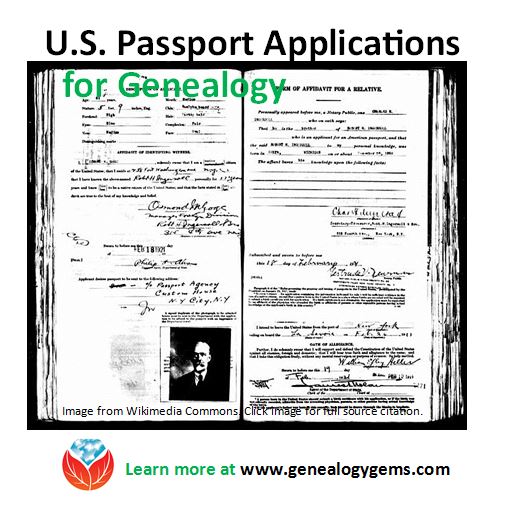
3 Strategies for Finding Catholic Church Records
U.S. Passport Applications: Finding Immigrant and Traveling Ancestors
by Lisa Cooke | Mar 23, 2016 | 01 What's New
This multimedia kit is a comprehensive and exciting way to learn to trace your Irish genealogy. Priced at just for EVERYTHING, you save nearly 0 on retail for a limited 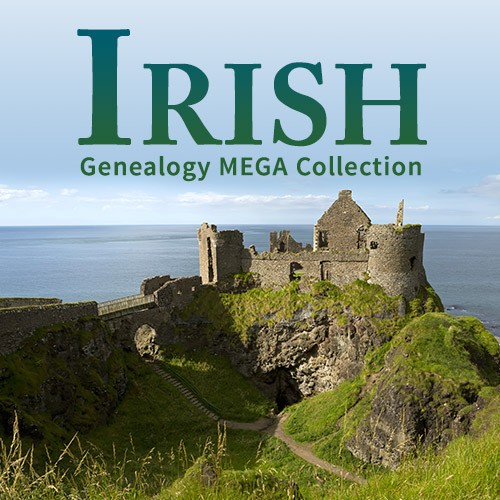 time, it’s a lucky deal, if I ever saw one!
time, it’s a lucky deal, if I ever saw one!
Tracing your Irish roots takes a bit of luck and a lot of patience. But the payoff for those who persist can be huge. The Irish have a rich history and culture that descendants love to embrace. And it’s getting more exciting to be an online Irish researcher, with important new Irish records coming online frequently.
One of the biggest Irish genealogy challenges is the destruction of the Public Records Office during the Irish Civil War. But while many records were lost, there are plenty of ways to find information on your ancestors.
Even better, during March Family Tree Magazine has slashed the price of its Irish Genealogy MEGA Collection. This comprehensive multimedia collection is a family historian’s pot of gold, packed with everything from tips on breaking down your Irish brick walls to finding vital and census records, immigration forms, and a thorough list of useful websites. Plus, you’ll get the historical background that drove emigration and affected your ancestors’ lives – as well as your research.
Here are the incredible tools you will get:
- EIGHT on-demand webinars on different aspects of Irish research
- A full-length e-book, A Genealogist’s Guide to Tracing Your Irish Ancestors
- A digital cheat sheet and an overview article for quick reference.
I love this multimedia kit because you can read, watch and learn at your own pace. The digital 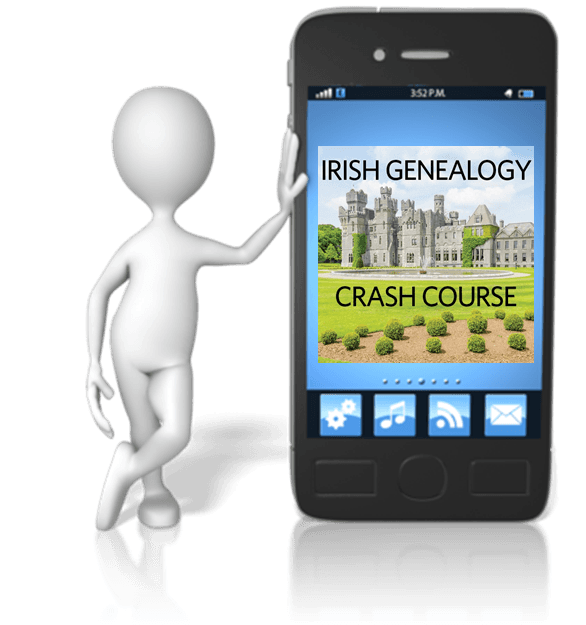 format means you can put the entire kit on your favorite mobile device. That lets you learn on-the-go and consult your reference library while you’re out researching. Of course you can use these materials on your home computer, too. The choice is yours–and with the limited-time price on this mega kit, the fabled luck of the Irish is yours, too!
format means you can put the entire kit on your favorite mobile device. That lets you learn on-the-go and consult your reference library while you’re out researching. Of course you can use these materials on your home computer, too. The choice is yours–and with the limited-time price on this mega kit, the fabled luck of the Irish is yours, too!
More Irish Genealogy Gems
by Lisa Cooke | Mar 18, 2016 | 01 What's New, Records & databases
Here’s our weekly roundup of interesting and new genealogy records online for Brazil, Denmark, England, Ireland and the U.S.
BRAZIL CIVIL REGISTRATIONS. Over 200,000 indexed records have been added to a free collection of Pernambuco, Brazil civil registrations (1804-2014) at FamilySearch.org.
DENMARK DEEDS AND MORTGAGES. FamilySearch.org has added nearly 3 million digitized images to its collection of browsable deeds and mortgages for South Jutland, Denmark (1572-1928).
ENGLAND COURT. Ancestry subscribers now have access to a new collection of Yorkshire, England, Quarter Session Records, 1637-1914 (1637-1914). According to the database description, these courts “had both a civil and a criminal jurisdiction, and before 1888 they also had an administrative function. Civil cases usually appear in the court’s order books and criminal cases in the indictment books.”
(1637-1914). According to the database description, these courts “had both a civil and a criminal jurisdiction, and before 1888 they also had an administrative function. Civil cases usually appear in the court’s order books and criminal cases in the indictment books.”
ENGLAND PROBATE. New Yorkshire, England, Probate Records, 1521-1858 are now available to Ancestry subscribers. These include wills, letters of administration and inventories.
are now available to Ancestry subscribers. These include wills, letters of administration and inventories.
ENGLAND TAX. About a quarter million land records are now included in FindMyPast’s database of Devon, Plymouth & West Devon Land Tax and Valuation Records 1897-1949. Use these to learn about an ancestor’s residence, property ownership and wealth.
IRELAND PARISH RECORDS. Ancestry has posted an Ireland, Catholic Parish Registers, 1655-1915 from the National Library of Ireland. Access to this index is already free on Findmypast.
from the National Library of Ireland. Access to this index is already free on Findmypast.
U.S. – AFRICAN-AMERICAN. About 35,000 indexed records and associated images have been added to a free collection of Freedmen’s Bureau marriages (1861-1872) at FamilySearch.org.
U.S. – ILLINOIS MARRIAGE. Nearly 200,00 total indexed marriage records for Illinois have been added to FamilySearch.org across three collections: church marriages, 1805-1985; civil marriages, 1833-1889 and county marriages, 1810-1934.
U.S. – MARYLAND CHURCH. A new collection of nearly 140,000 free, indexed records from a variety of Maryland churches (1668-1995) has been added to FamilySearch.org.
U.S. WAR OF 1812. 1.3 million indexed records have been added to a free United States War of 1812 Index to Service Records at FamilySearch.org.
Get weekly updates right in your email inbox with our free newsletter! Click to sign up. 
Disclosure: This article contains affiliate links and Genealogy Gems will be compensated if you make a purchase after clicking on these links (at no additional cost to you). Thank you for supporting Genealogy Gems!
by Lisa Cooke | Mar 17, 2016 | 01 What's New, Conferences
The Topeka Genealogical Society welcomes Lisa Louise Cooke to its annual conference on Sat, April 16, 2016. Early-bird registration ends soon, so register now!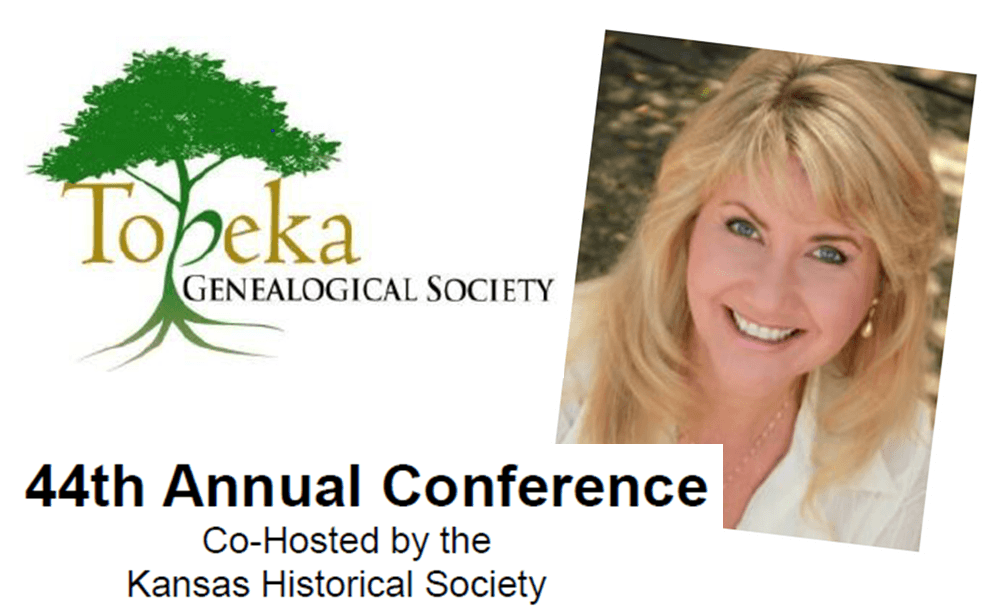
Lisa Louise Cooke will give a full day of lectures at the 44th annual conference of the Topeka Genealogical Society (April 15-16, 2016). The conference theme is “New Techniques for the Family History Detective” and Lisa will definitely cover that theme in these four Saturday presentations:
- Google Tools & Procedures for Solving Family History Mysteries
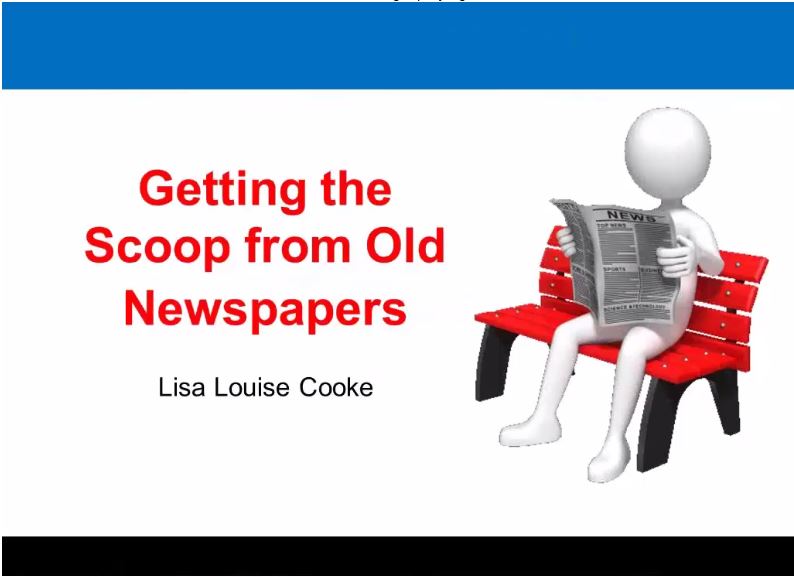
- Get the Scoop on Your Ancestors with Newspapers
- How to Re-Open a Cold Case
- The Google Earth Game Show
WHAT: Topeka Genealogical Society Annual Conference
WHEN: April 15-16, 2016
WHERE: Kansas Historical Society, 6425 SW 6th St, Topeka, KS
REGISTER: Click here for info and/or to register online
There will also be access to vendors, exhibits, and representatives from historical and lineage organizations. Early-bird registration ends March 24, 2016. Mailed registrations must be received by April 1, 2016.
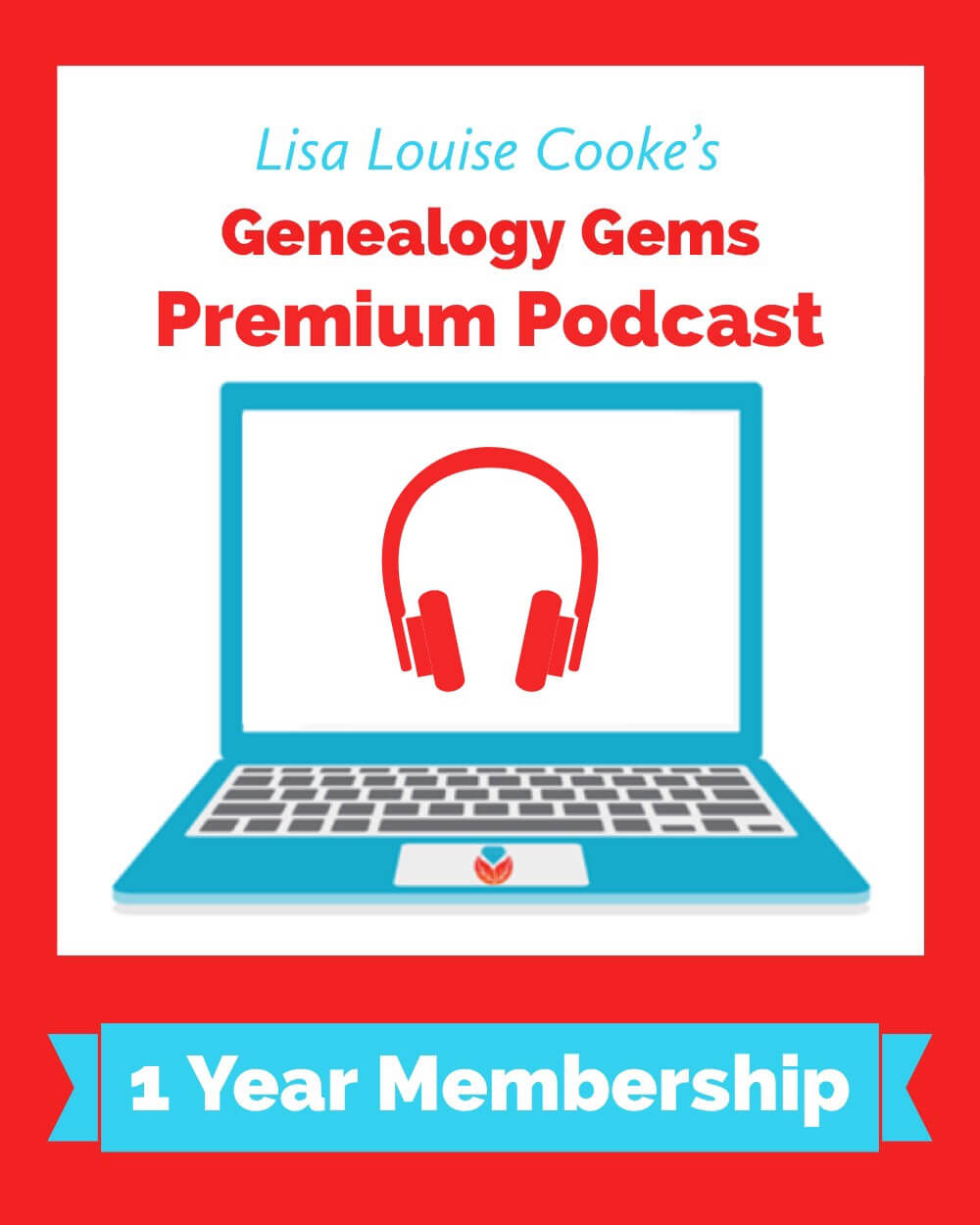 Can’t make it to the conference? Genealogy Gems Premium members have a full-year’s access to about 30 full-length on-demand video classes by Lisa Louise, including Google search methodologies, newspaper research, solving cold-case family history mysteries and Google Earth. Click here to see the full list of video classes. Click here to learn more about Premium membership.
Can’t make it to the conference? Genealogy Gems Premium members have a full-year’s access to about 30 full-length on-demand video classes by Lisa Louise, including Google search methodologies, newspaper research, solving cold-case family history mysteries and Google Earth. Click here to see the full list of video classes. Click here to learn more about Premium membership.





 time, it’s a lucky deal, if I ever saw one!
time, it’s a lucky deal, if I ever saw one! format means you can put the entire kit on your favorite mobile device. That lets you learn on-the-go and consult your reference library while you’re out researching. Of course you can use these materials on your home computer, too. The choice is yours–and with the limited-time price on this
format means you can put the entire kit on your favorite mobile device. That lets you learn on-the-go and consult your reference library while you’re out researching. Of course you can use these materials on your home computer, too. The choice is yours–and with the limited-time price on this 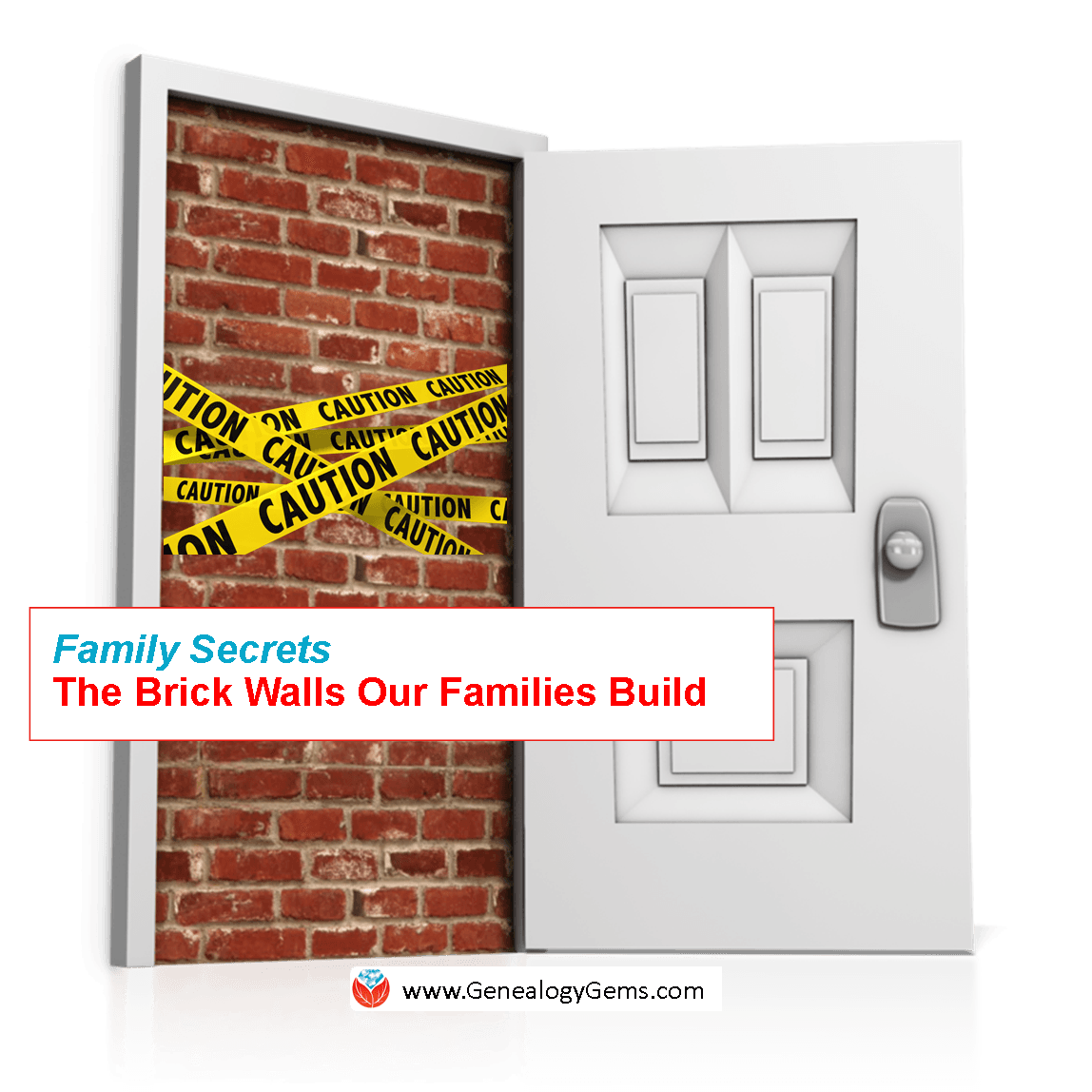 Beginning Irish Genealogy: Free Tips and Records
Beginning Irish Genealogy: Free Tips and Records


 Can’t make it to the conference?
Can’t make it to the conference? 


